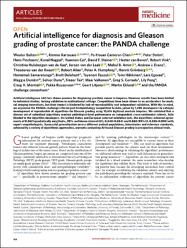Artificial intelligence for diagnosis and Gleason grading of prostate cancer: The PANDA challenge

Göster/
Erişim
info:eu-repo/semantics/openAccessAttribution 4.0 Internationalhttps://creativecommons.org/licenses/by/4.0/Tarih
2022Yazar
Bulten, WouterKartasalo, Kimmo
Chen, Po-Hsuan Cameron
Ström, Peter
Pinckaers, Hans
Nagpal, Kunal
Cai, Yuannan
Steiner, David F.
van Boven, Hester
Vink, Robert
Hulsbergen-van de Kaa, Christina
van der Laak, Jeroen
Amin, Mahul B.
Evans, Andrew J.
van der Kwast, Theodorus
Allan, Robert
Humphrey, Peter A.
Grönberg, Henrik
Samaratunga, Hemamali
Delahunt, Brett
Tsuzuki, Toyonori
Häkkinen, Tomi
Egevad, Lars
Demkin, Maggie
Dane, Sohier
Tan, Fraser
Valkonen, Masi
Corrado, Greg S.
Peng, Lily
Mermel, Craig H.
Ruusuvuori, Pekka
Litjens, Geert
Eklund, Martin
Brilhante, Américo
Çakır, Aslı
Farré, Xavier
Geronatsiou, Katerina
Molinié, Vincent
Pereira, Guilherme
Roy, Paromita
Saile, Günter
Salles, Paulo G. O.
Schaafsma, Ewout
Tschui, Joëlle
Billoch-Lima, Jorge
Pereira, Emíio M.
Zhou, Ming
He, Shujun
Song, Sejun
Sun, Qing
Yoshihara, Hiroshi
Yamaguchi, Taiki
Ono, Kosaku
Shen, Tao
Ji, Jianyi
Roussel, Arnaud
Zhou, Kairong
Chai, Tianrui
Weng, Nina
Grechka, Dmitry
Üst veri
Tüm öğe kaydını gösterKünye
Bulten, W., Kartasalo, K., Chen, Po-H. C., Ström, P., Pinckaers, H., Nagpal, K. ... Grechka, D. (2022). Artificial intelligence for diagnosis and Gleason grading of prostate cancer: The PANDA challenge. Nature Medicine, 28(1), 154-+. https://doi.org/10.1038/s41591-021-01620-2Özet
Through a community-driven competition, the PANDA challenge provides a curated diverse dataset and a catalog of models for prostate cancer pathology, and represents a blueprint for evaluating AI algorithms in digital pathology.
Artificial intelligence (AI) has shown promise for diagnosing prostate cancer in biopsies. However, results have been limited to individual studies, lacking validation in multinational settings. Competitions have been shown to be accelerators for medical imaging innovations, but their impact is hindered by lack of reproducibility and independent validation. With this in mind, we organized the PANDA challenge-the largest histopathology competition to date, joined by 1,290 developers-to catalyze development of reproducible AI algorithms for Gleason grading using 10,616 digitized prostate biopsies. We validated that a diverse set of submitted algorithms reached pathologist-level performance on independent cross-continental cohorts, fully blinded to the algorithm developers. On United States and European external validation sets, the algorithms achieved agreements of 0.862 (quadratically weighted kappa, 95% confidence interval (CI), 0.840-0.884) and 0.868 (95% CI, 0.835-0.900) with expert uropathologists. Successful generalization across different patient populations, laboratories and reference standards, achieved by a variety of algorithmic approaches, warrants evaluating AI-based Gleason grading in prospective clinical trials.
WoS Q Kategorisi
Q1Scopus Q Kategorisi
Q1Kaynak
Nature MedicineCilt
28Sayı
1Koleksiyonlar
- Makale Koleksiyonu [3777]
- PubMed İndeksli Yayınlar Koleksiyonu [4230]
- Scopus İndeksli Yayınlar Koleksiyonu [6574]
- WoS İndeksli Yayınlar Koleksiyonu [6631]


















